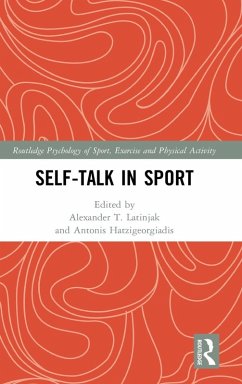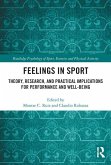Self-talk in Sport
Herausgeber: Latinjak, Alexander T.; Hatzigeorgiadis, Antonis
187,99 €
inkl. MwSt.
**Unverbindliche Preisempfehlung des Herstellers
Versandkostenfrei*Versandfertig in 1-2 Wochen

94 °P sammeln
Self-talk in Sport
Herausgeber: Latinjak, Alexander T.; Hatzigeorgiadis, Antonis
- Gebundenes Buch
- Merkliste
- Auf die Merkliste
- Bewerten Bewerten
- Teilen
- Produkt teilen
- Produkterinnerung
- Produkterinnerung
Self-talk in Sport is a tool for sports psychologists to understand and interact with hidden parts within athletes that have a major impact on sport and exercise experiences and performance.
Andere Kunden interessierten sich auch für
![Self-talk in Sport Self-talk in Sport]() Self-talk in Sport42,99 €
Self-talk in Sport42,99 €![Endurance Performance in Sport Endurance Performance in Sport]() Endurance Performance in Sport40,99 €
Endurance Performance in Sport40,99 €![Feelings in Sport Feelings in Sport]() Feelings in Sport42,99 €
Feelings in Sport42,99 €![The Psychology of Closed Self-Paced Motor Tasks in Sports The Psychology of Closed Self-Paced Motor Tasks in Sports]() The Psychology of Closed Self-Paced Motor Tasks in Sports45,99 €
The Psychology of Closed Self-Paced Motor Tasks in Sports45,99 €![The Psychology of Closed Self-Paced Motor Tasks in Sports The Psychology of Closed Self-Paced Motor Tasks in Sports]() The Psychology of Closed Self-Paced Motor Tasks in Sports142,99 €
The Psychology of Closed Self-Paced Motor Tasks in Sports142,99 €![Athletic Development Athletic Development]() Athletic Development73,99 €
Athletic Development73,99 €![Stress, Well-Being, and Performance in Sport Stress, Well-Being, and Performance in Sport]() Stress, Well-Being, and Performance in Sport182,99 €
Stress, Well-Being, and Performance in Sport182,99 €-
-
-
Self-talk in Sport is a tool for sports psychologists to understand and interact with hidden parts within athletes that have a major impact on sport and exercise experiences and performance.
Hinweis: Dieser Artikel kann nur an eine deutsche Lieferadresse ausgeliefert werden.
Hinweis: Dieser Artikel kann nur an eine deutsche Lieferadresse ausgeliefert werden.
Produktdetails
- Produktdetails
- Routledge Psychology of Sport, Exercise and Physical Activity
- Verlag: Taylor & Francis Ltd
- Seitenzahl: 246
- Erscheinungstermin: 12. März 2020
- Englisch
- Abmessung: 235mm x 157mm x 18mm
- Gewicht: 498g
- ISBN-13: 9781138624672
- ISBN-10: 1138624675
- Artikelnr.: 60095067
- Herstellerkennzeichnung
- Libri GmbH
- Europaallee 1
- 36244 Bad Hersfeld
- gpsr@libri.de
- Routledge Psychology of Sport, Exercise and Physical Activity
- Verlag: Taylor & Francis Ltd
- Seitenzahl: 246
- Erscheinungstermin: 12. März 2020
- Englisch
- Abmessung: 235mm x 157mm x 18mm
- Gewicht: 498g
- ISBN-13: 9781138624672
- ISBN-10: 1138624675
- Artikelnr.: 60095067
- Herstellerkennzeichnung
- Libri GmbH
- Europaallee 1
- 36244 Bad Hersfeld
- gpsr@libri.de
Alexander T. Latinjak is a senior lecturer and the course leader of the BSc (Hons) Sport and Performance Psychology at the University of Suffolk, and visiting researcher at the EUSES Schools of Health and Sports Sciences in Catalonia. Although Alexander wrote his dissertation on strategic self-talk interventions for tennis players, he has recently been more intensively involved in the study of spontaneous and goal-directed self-talk. His research led to the design of a reflexive self-talk intervention and the development of a conceptualisation of self-talk based on the distinction between organic and strategic self-talk. Antonis Hatzigeorgiadis is a professor at the Department of Physical Education and Sport Science at the University of Thessaly, and director of the postgraduate programme Psychology of Physical Education and Sport. His main research interest has been self-talk, on which he has authored more than 35 articles and six book chapters. He is Associate Editor at Sport, Exercise and Sport Psychology, and has served as member of the managing council of the European Federation of Sport and Exercise Psychology for 12 years.
1. Locating self-talk in the knowledge map of sport and exercise psychology
2. Pieces of the self-talk jigsaw puzzle: An introduction
3. Assessment methods for organic self-talk
4. Metacognition and goal-directed self-talk
5. Self-talk and emotion regulation
6. Organic self-talk antecedents: An interpretative review and implications
for practice
7. The reflexive self-talk intervention: Detailed procedures
8. Rational self-talk: A rational emotive behaviour therapy (REBT)
perspective
9. Strategic self-talk interventions
10. Self-talk mechanisms
11. Self-talk interventions in tennis and golf
12. Self-talk interventions in team-sport settings
13. Self-talk and endurance sports
14. Self-talk in physical education: Motivational aspects and a guide for
physical education teachers
15. Contesting the role of self-talk in sport psychology in views of
mindfulness, flow, and mind wandering
Epilogue: Some facts and personal reflections on my self-talk
2. Pieces of the self-talk jigsaw puzzle: An introduction
3. Assessment methods for organic self-talk
4. Metacognition and goal-directed self-talk
5. Self-talk and emotion regulation
6. Organic self-talk antecedents: An interpretative review and implications
for practice
7. The reflexive self-talk intervention: Detailed procedures
8. Rational self-talk: A rational emotive behaviour therapy (REBT)
perspective
9. Strategic self-talk interventions
10. Self-talk mechanisms
11. Self-talk interventions in tennis and golf
12. Self-talk interventions in team-sport settings
13. Self-talk and endurance sports
14. Self-talk in physical education: Motivational aspects and a guide for
physical education teachers
15. Contesting the role of self-talk in sport psychology in views of
mindfulness, flow, and mind wandering
Epilogue: Some facts and personal reflections on my self-talk
1. Locating self-talk in the knowledge map of sport and exercise psychology
2. Pieces of the self-talk jigsaw puzzle: An introduction
3. Assessment methods for organic self-talk
4. Metacognition and goal-directed self-talk
5. Self-talk and emotion regulation
6. Organic self-talk antecedents: An interpretative review and implications
for practice
7. The reflexive self-talk intervention: Detailed procedures
8. Rational self-talk: A rational emotive behaviour therapy (REBT)
perspective
9. Strategic self-talk interventions
10. Self-talk mechanisms
11. Self-talk interventions in tennis and golf
12. Self-talk interventions in team-sport settings
13. Self-talk and endurance sports
14. Self-talk in physical education: Motivational aspects and a guide for
physical education teachers
15. Contesting the role of self-talk in sport psychology in views of
mindfulness, flow, and mind wandering
Epilogue: Some facts and personal reflections on my self-talk
2. Pieces of the self-talk jigsaw puzzle: An introduction
3. Assessment methods for organic self-talk
4. Metacognition and goal-directed self-talk
5. Self-talk and emotion regulation
6. Organic self-talk antecedents: An interpretative review and implications
for practice
7. The reflexive self-talk intervention: Detailed procedures
8. Rational self-talk: A rational emotive behaviour therapy (REBT)
perspective
9. Strategic self-talk interventions
10. Self-talk mechanisms
11. Self-talk interventions in tennis and golf
12. Self-talk interventions in team-sport settings
13. Self-talk and endurance sports
14. Self-talk in physical education: Motivational aspects and a guide for
physical education teachers
15. Contesting the role of self-talk in sport psychology in views of
mindfulness, flow, and mind wandering
Epilogue: Some facts and personal reflections on my self-talk







